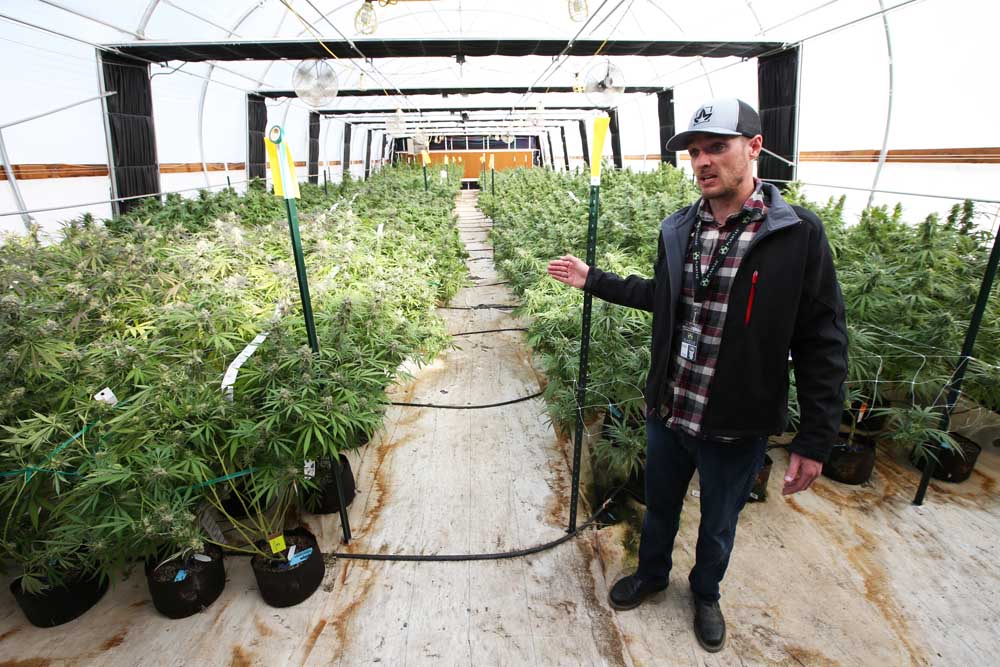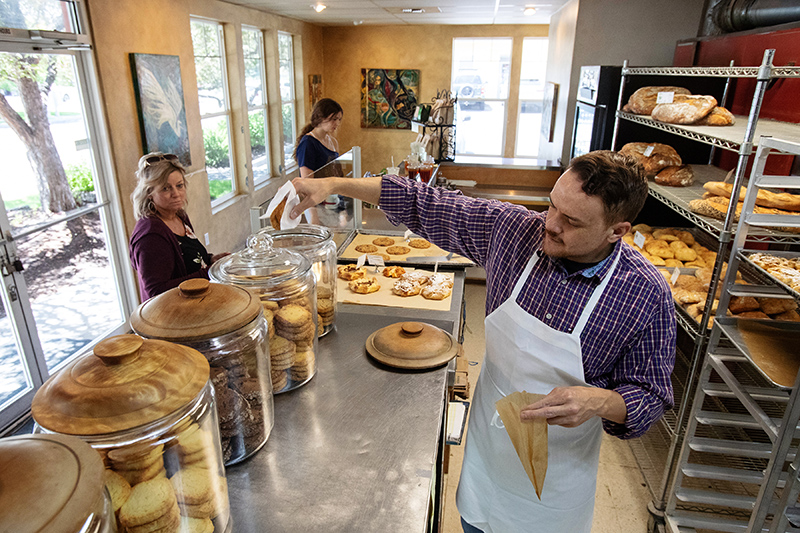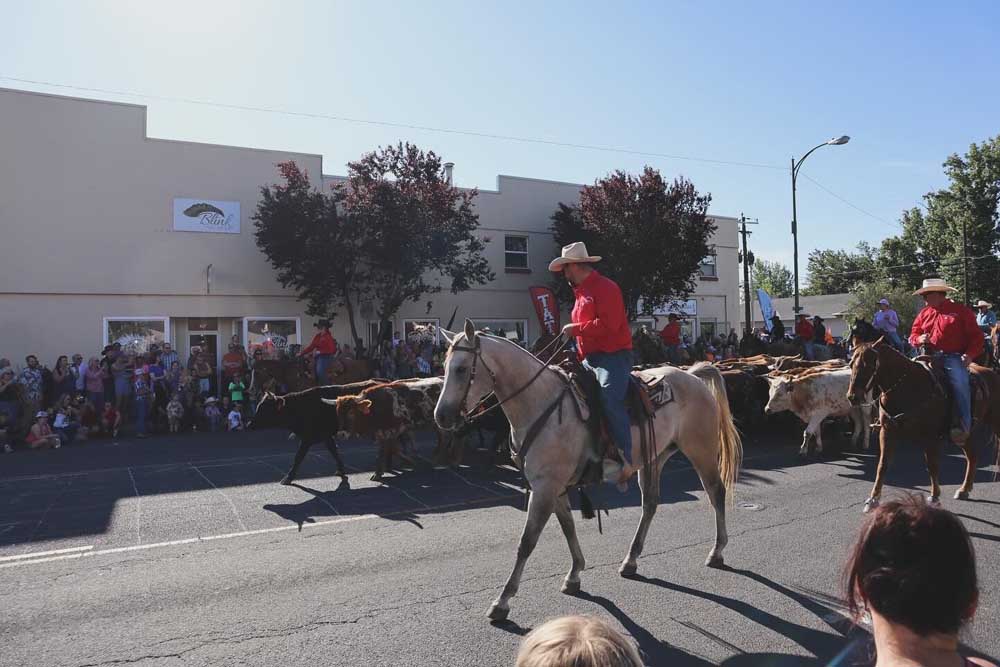Oregon marijuana regulators don’t track criminal backgrounds
Published 12:00 am Sunday, June 9, 2019

- In this file photo, Andrew J. Anderson is seen at his Alfalfa Valley Cannabis Farm on Oct. 11, 2018.
If Plantae Health owner Andrew J. Anderson is convicted of abuse and other felony charges, he’ll join a short list of Central Oregon marijuana business owners who have come under scrutiny by regulators for criminal activity.
The Oregon Liquor Control Commission denied a worker permit to Oregrown CEO Aviv Hadar because of a 2015 assault conviction, though that decision was overturned by an administrative law judge. The OLCC revoked the licenses of Charles Ringo and Leonard Peverieri after their growing operation was linked to an illegal lab making high-potency extracts.
The OLCC takes a case-by-case approach to criminal backgrounds of people applying to work in the marijuana industry and the conduct of current licensees. While the agency has run background checks for 44,622 worker permits, state regulators can’t say how many of those turned up criminal records. The criminal background information isn’t available because the OLCC doesn’t keep track of it after the screening process.
Since the OLCC began issuing recreational cannabis licenses in 2016, only six license applicants and 194 licensed workers have been denied because of criminal issues, false statements or previous denial of a license, according to the most recent OLCC report.
“We’re transitioning from a black market to a recreational system, so it’s important that we don’t exclude the people who really started the industry in Oregon,” said Justin Reed, compliance officer at Shadowbox Farms in southern Oregon. “The overall effect on the industry has been super positive.”
The Legislature recently passed Senate Bill 420, which makes it easier for people previously convicted of possession, delivery or manufacture of marijuana to have a conviction set aside because the offense is no longer illegal.
Regulators and at least one cannabis advocate draw a line at violent crimes and abuse.
“We’re not bad people,” said Madeline Martinez, Oregon National Organization for the Reform of Marijuana Laws executive director. “If you have a record as a black market grower or distributor, you haven’t hurt anyone. But there are bad actors.”
So when Anderson, owner of a retail marijuana shop, was charged in Deschutes County Circuit Court in May with 20 counts including involuntary servitude and kidnapping, it raised the question of how the OLCC would respond.
For those already licensed, convictions and arrests must be reported to the OLCC within 24 hours, spokesman Mark Pettinger said. A felony conviction, even if it’s not related to a the cannabis industry, could affect the license renewal. Arrests unrelated to the licensed marijuana business don’t require any OLCC action, and the worker can continue in the industry, Pettinger said.
“We don’t expect to be their first phone call,” Pettinger said. “Someone charged has to go through the criminal process first. The only time we step in is if that activity directly impacts the licensed activity like by diverting the product into the illegal market.”
The OLCC has 19 people reviewing license applications for retailers, wholesalers, labs and processors, as well as recreational marijuana worker’s permits. Each person who works in the industry is required to obtain a worker permit that is valid for five years, Pettinger said.
The agency has the legal latitude to determine the weight of a prior conviction in granting approval, Pettinger said.
The OLCC has discretion when it issues a worker permit, Pettinger said. It can accept or deny an applicant because of DUII, drug or felony convictions and misdemeanor criminal activity, according to the OLCC website. Pettinger said the OLCC reviews “the totality of the circumstances of past behavior.”
A factor that can be considered by the OLCC is the length of time between the charges or criminal behavior and the application, he said.
Not everyone agrees with the OLCC’s view of past criminal actions.
“Criminal convictions do matter when determining whether or not someone should be working in marijuana businesses,” Deschutes County Sheriff Shane Nelson wrote in an email. “Those convicted of drug-related crimes like manufacturing and delivery of controlled substances don’t belong owning marijuana businesses or working for them.”
Nelson said often the OLCC is hampered by a shortage of investigators. More than a year ago, the OLCC pushed the pause button on accepting new applications while it worked on processing a backlog.
Because of concern for black market activities, the Deschutes County Sheriff’s Office and the Bend Police Department have formed a partnership that resulted in 11 search warrants and 14 arrests over the last six months, according to data presented at an April Deschutes County Commission meeting.
Case studies
It was 2015 when Oregrown CEO Hadar was convicted of second-degree assault for an altercation at The Astro Lounge. He served a 30-day sentence and paid a $24,250 fine, according to court documents. In 2016, Hadar submitted an application for a marijuana worker permit that was initially denied because of the assault conviction, and the conviction was less than two years from the application date, according to court records. An administrative law judge overturned the OLCC’s denial, and Hadar was issued a worker permit.
As the CEO of a company that employs about 60 people, Hadar doesn’t believe that what happened at the bar should define him.
“The (OLCC) goes to great lengths to ensure that a fair and level playing field is maintained for all,” Hadar wrote in an email. “Any individual or aspiring entrepreneur who has a desire to work in this burgeoning industry, yet feels that they may not be welcomed because of their past life experiences — whether they be criminal convictions or mistakes — should not define themselves by those experiences.”
Law enforcement officers notified the OLCC after police issued a search warrant in 2018 at a Bend home following an explosion from an illegal lab. At the home, officers found plants using cannabis tracking tags assigned to High Cascade Farms. Ringo, a former Oregon state senator, was registered as owning 85% of the growing facility.
While Ringo was not charged, the OLCC cited numerous license violations stemming from a failure to enter data into the state’s cannabis tracking system, suggesting marijuana may have been diverted to the black market.
The OLCC last summer revoked the license held by Ringo and Peverieri, a stockholder, to grow cannabis. A letter of reprimand was also issued and may be used to consider future applications, according to the OLCC stipulated settlement.
Ringo said Thursday he would not comment on the incident.
Anderson was notified by letter of felony charges pending against him in Deschutes County Circuit Court that he abused his wife and another woman, a former employee.
Pettinger confirmed that Anderson notified the OLCC on Tuesday of the pending charges. The OLCC has begun a review.
Anderson did not return emails or phone calls from The Bulletin.
— Reporter: 541-633-2117, sroig@bendbulletin.com






